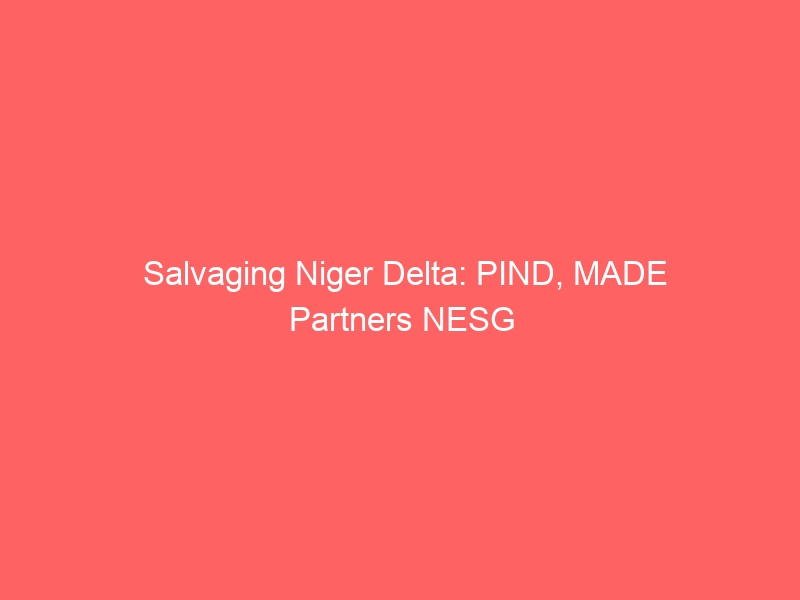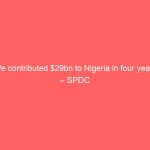…Niger Delta importance is centered on oil – PIND
…N/Delta is crucial to Nigeria’s Devt. – Fidelis Ekom
The Foundation for Partnership Initiatives in the Niger Delta (PIND) and Market Development Project in the Niger Delta (MADE), on October 11, 2017, partnered with the Nigerian Economic Summit’s Sustainability Policy Commission to sponsor a breakout session at the Transcorp Hilton in Abuja.
This was contained in a release today from the organisation and made available to GbaramatuVoice.
According to the release, the main thrust of this year’s summit was built around “Low Carbon Investment Opportunities for Economic Recovery and Growth Plan (ERGP) in Niger Delta Communities”.
The group further explained that this year’s edition of the annual Nigerian Economic Summit which has “Opportunities, Productivity, and Employment: Actualizing the Economic Recovery and Growth Plan” as the theme was a direct response to the Nigerian government’s plan to strengthen and diversify the Nigerian economy.
PIND stated further that the expectation was that the ten policy breakout sessions will generate short, medium and long-term plans that address the challenges of economic inclusion, access to capital, legislation, skills building, and local production.
Continuing, the organisation explained that this edition also marks the first time that the Nigerian Economic Summit will hold a session on Niger Delta development, which is important for several reasons.
Firstly, it is noted that nearly 32 million Nigerians representing over 40 different ethnic groups live in the Niger Delta. Again, even though the oil-rich region is the source of 75% of Nigeria’s foreign exchange earnings, over 70% of the population in the region live on an average of less than US $2 a day and are beset by diverse development challenges.
Furthermore, the group stressed that the region’s importance has typically centered on oil but the sector provides only 0.01% of Nigeria’s total jobs. Agriculture, while still hampered by low productivity and land-based conflicts in the Niger Delta, remains a key sector for unlocking growth for both the region and the whole country, employing approximately 45% of the workforce.
Explaining further, PIND’s Deputy Executive Director, Mr. Tunji Idowu pointed out that “It is no coincidence that this panel is happening this year, following one of the worst economic recessions that Nigeria has seen.”
Tunji Idowu added that “The Nigerian government’s Economic Recovery and Growth Plan (ERGP) to put us back on the path of sustained economic growth presents a unique opportunity for non-oil sector development in the Niger Delta.”
The development he opined will tackle youth restiveness and employment while adding that they can only ensure the sustainability of the Nigerian economy by focusing on sectors with high-growth potential and that is why agriculture is so important.
In a related development, Dr. Princewill Ekanim, Director of Special Duties at the Niger Delta Development Commission (NDDC), reemphasized on the Commission’s work and willingness to partner with the private sector on notable projects.
In the same vein, Eze Wakanma, Union Bank’s Unit Head of Corporate Agriculture also discussed plans to improve farmers’ access to improved technologies and set up Agricultural Finance Centers and locally-based agency banks in farming communities.
Also at the event, Shell Petroleum Development Company of Nigeria Limited (SPDC) and Country Chair Mr. Osagie Okunbor praised the session and the organisers following the discussions.
In his words, “I have been listening in on the different group sessions and was very impressed with the quality of the recommendations. This was top notch, and I give credit to PIND and MADE for organizing this worthwhile session.”
On the significance of the gathering, Sola Abulu, External Relations Communications Manager for SPDC, explained that “What this event has further crystallized for me is that the problem of access to energy will have to be fixed with solutions that are homegrown.”
The SPDC Relationship Manager further added that “It is all about innovation and coming together to deliver value.”
The event also brought the opportunity for participants to form partnerships. Among the outcomes of this session, NDDC and Union Bank both agreed to work together on agricultural development in the Niger Delta.
Responding, the Niger Delta-focused organizations at the session expressed pleasure at the outcome of the event and hoped that it will begin a larger effort to mainstream the region into the national conversation on economic diversification.
According to Fidelis Ekom, Advocacy Manager for MADE, “The Niger Delta is crucial to Nigeria’s development, and not just because of oil. Partnerships like ours with PIND and now NESG are important because no organization can address the development challenges facing the Niger Delta alone.”
Present at the session were representatives from energy companies such as Oando, Royal Dutch Shell’s All On; agribusiness firms like Syngenta and Olam.
Others include; the German development organization, Heinrich Boell Foundation, and States and Federal government representatives from Rural Electrification Agency, Nigeria Incentive-Based Risk Sharing System for Agricultural Lending (NIRSAL), the Presidency and Ministry of Environment, among many others.












